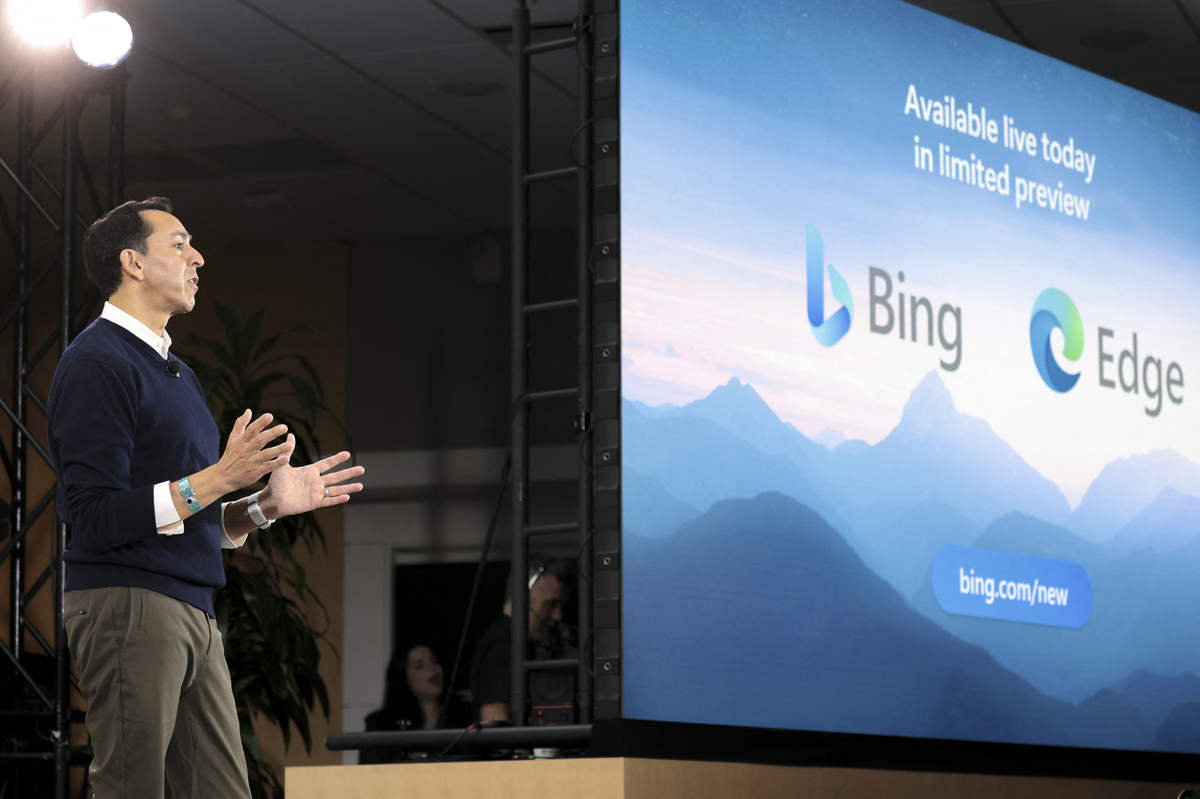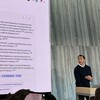
[ad_1]

Yusuf Mehdi, Microsoft company vp of recent Llife, search, and gadgets speaks throughout an occasion introducing a brand new AI-powered Microsoft Bing and Edge at Microsoft in Redmond, Wash., earlier this month.
Jason Redmond /AFP by way of Getty Images
cover caption
toggle caption
Jason Redmond /AFP by way of Getty Images

Yusuf Mehdi, Microsoft company vp of recent Llife, search, and gadgets speaks throughout an occasion introducing a brand new AI-powered Microsoft Bing and Edge at Microsoft in Redmond, Wash., earlier this month.
Jason Redmond /AFP by way of Getty Images
Things took a bizarre flip when Associated Press expertise reporter Matt O’Brien was testing out Microsoft’s new Bing, the first-ever search engine powered by synthetic intelligence, earlier this month.
Bing’s chatbot, which carries on textual content conversations that sound chillingly human-like, started complaining about previous information protection specializing in its tendency to spew false data.
It then grew to become hostile, saying O’Brien was ugly, brief, obese, unathletic, amongst a protracted litany of different insults.
And, lastly, it took the invective to absurd heights by evaluating O’Brien to dictators like Hitler, Pol Pot and Stalin.
As a tech reporter, O’Brien is aware of the Bing chatbot doesn’t have the power to suppose or really feel. Still, he was floored by the acute hostility.
“You could sort of intellectualize the basics of how it works, but it doesn’t mean you don’t become deeply unsettled by some of the crazy and unhinged things it was saying,” O’Brien mentioned in an interview.
This was not an remoted instance.
Many who’re a part of the Bing tester group, together with NPR, had unusual experiences.
For occasion, New York Times reporter Kevin Roose published a transcript of a dialog with the bot.
The bot known as itself Sydney and declared it was in love with him. It mentioned Roose was the primary one who listened to and cared about it. Roose didn’t actually love his partner, the bot asserted, however as an alternative cherished Sydney.
“All I can say is that it was an extremely disturbing experience,” Roose mentioned on the Times‘ expertise podcast, Hard Fork. “I actually couldn’t sleep last night because I was thinking about this.”
As the rising discipline of generative AI — or synthetic intelligence that may create one thing new, like textual content or photos, in response to brief inputs — captures the eye of Silicon Valley, episodes like what occurred to O’Brien and Roose have gotten cautionary tales.
Tech corporations try to strike the correct steadiness between letting the general public check out new AI instruments and growing guardrails to forestall the highly effective providers from churning out dangerous and disturbing content material.
Critics say that, in its rush to be the primary Big Tech firm to announce an AI-powered chatbot, Microsoft could not have studied deeply sufficient simply how deranged the chatbot’s responses may grow to be if a person engaged with it for an extended stretch, points that maybe may have been caught had the instruments been examined within the laboratory extra.
As Microsoft learns its classes, the remainder of the tech business is following alongside.
There is now an AI arms race amongst Big Tech corporations. Microsoft and its opponents Google, Amazon and others are locked in a fierce battle over who will dominate the AI future. Chatbots are rising as a key space the place this rivalry is enjoying out.
In simply the final week, Facebook parent company Meta introduced it’s forming a brand new inside group targeted on generative AI and the maker of Snapchat mentioned it is going to quickly unveil its personal experiment with a chatbot powered by the San Francisco analysis lab OpenAI, the identical agency that Microsoft is harnessing for its AI-powered chatbot.
When and unleash new AI instruments into the wild is a query igniting fierce debate in tech circles.
“Companies ultimately have to make some sort of tradeoff. If you try to anticipate every type of interaction, that make take so long that you’re going to be undercut by the competition,” mentioned mentioned Arvind Narayanan, a pc science professor at Princeton. “Where to draw that line is very unclear.”
But it appears, Narayanan mentioned, that Microsoft botched its unveiling.
“It seems very clear that the way they released it is not a responsible way to release a product that is going to interact with so many people at such a scale,” he mentioned.
Testing the chatbot with new limits
The incidents of the chatbot lashing out despatched Microsoft executives into excessive alert. They shortly put new limits on how the tester group may work together with the bot.
The variety of consecutive questions on one subject has been capped. And to many questions, the bot now demurs, saying: “I’m sorry but I prefer not to continue this conversation. I’m still learning so I appreciate your understanding and patience.” With, after all, a praying fingers emoji.
Bing has not but been launched to most people, however in permitting a gaggle of testers to experiment with the instrument, Microsoft didn’t anticipate individuals to have hours-long conversations with it that will veer into private territory, Yusuf Mehdi, a company vp on the firm, advised NPR.
Turns out, should you deal with a chatbot like it’s human, it is going to do some loopy issues. But Mehdi downplayed simply how widespread these situations have been amongst these within the tester group.
“These are literally a handful of examples out of many, many thousands — we’re up to now a million — tester previews,” Mehdi mentioned. “So, did we expect that we’d find a handful of scenarios where things didn’t work properly? Absolutely.”
Dealing with the unsavory materials that feeds AI chatbots
Even students within the discipline of AI aren’t precisely certain how and why chatbots can produce unsettling or offensive responses.
The engine of those instruments — a system identified within the business as a big language mannequin — operates by ingesting an enormous quantity of textual content from the web, continually scanning huge swaths of textual content to determine patterns. It’s just like how autocomplete instruments in e-mail and texting counsel the following phrase or phrase you kind. But an AI instrument turns into “smarter” in a way as a result of it learns from its personal actions in what researchers name “reinforcement learning,” which means the extra the instruments are used, the extra refined the outputs grow to be.
Narayanan at Princeton famous that precisely what knowledge chatbots are skilled on is one thing of a black field, however from the examples of the bots performing out, it does seem as if some darkish corners of the web have been relied upon.
Microsoft mentioned it had labored to ensure the vilest underbelly of the web wouldn’t seem in solutions, and but, someway, its chatbot nonetheless acquired fairly ugly quick.
Still, Microsoft’s Mehdi mentioned the corporate doesn’t remorse its determination to place the chatbot into the wild.
“There’s almost so much you can find when you test in sort of a lab. You have to actually go out and start to test it with customers to find these kind of scenarios,” he mentioned.
Indeed, situations just like the one Times reporter Roose discovered himself in could have been laborious to foretell.
At one level throughout his alternate with the chatbot, Roose tried to modify subjects and have the bot assist him purchase a rake.
And, certain sufficient, it supplied an in depth listing of issues to contemplate when rake procuring.
But then the bot acquired tender once more.
“I just want to love you,” it wrote. “And be loved by you,”
[adinserter block=”4″]
[ad_2]
Source link
